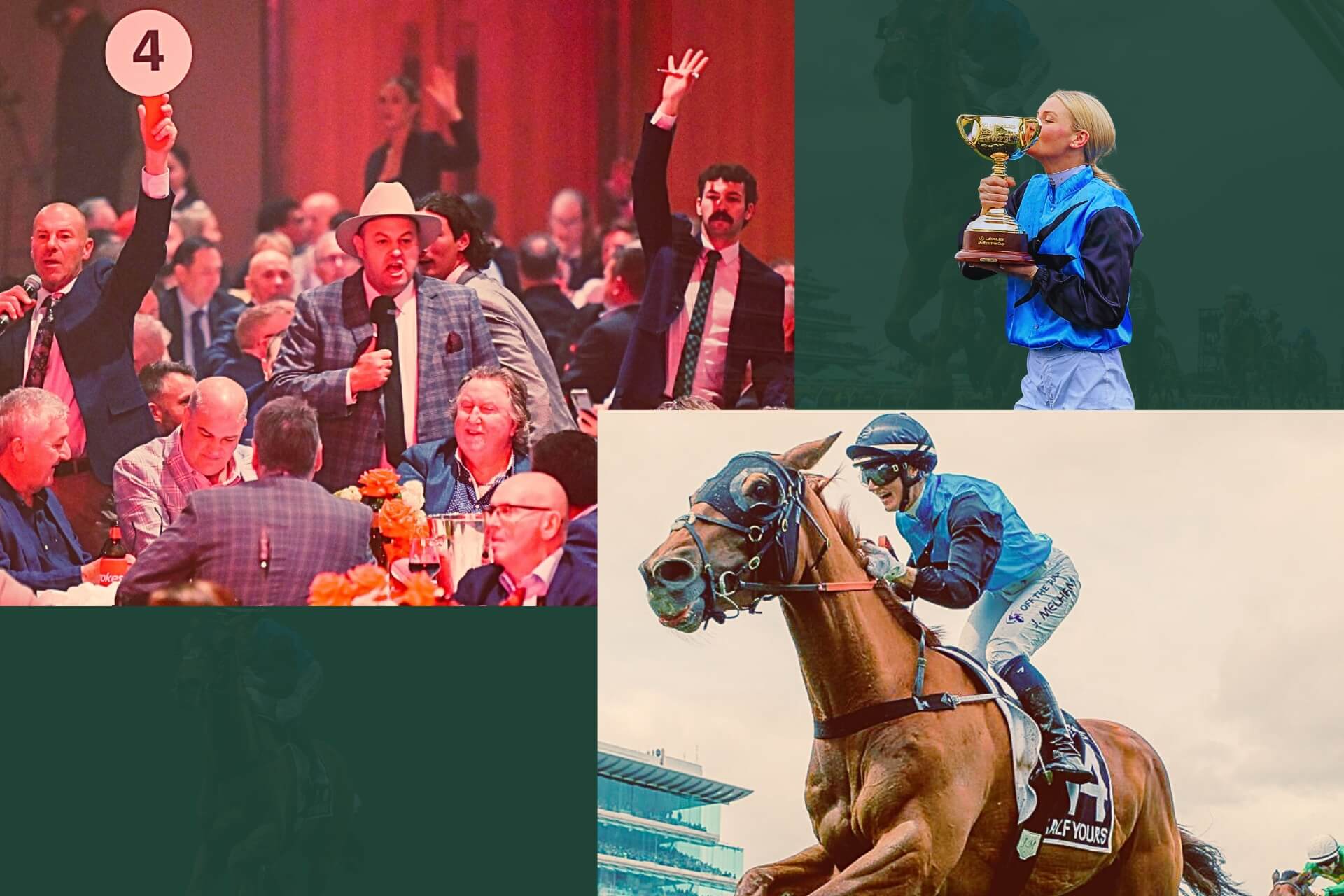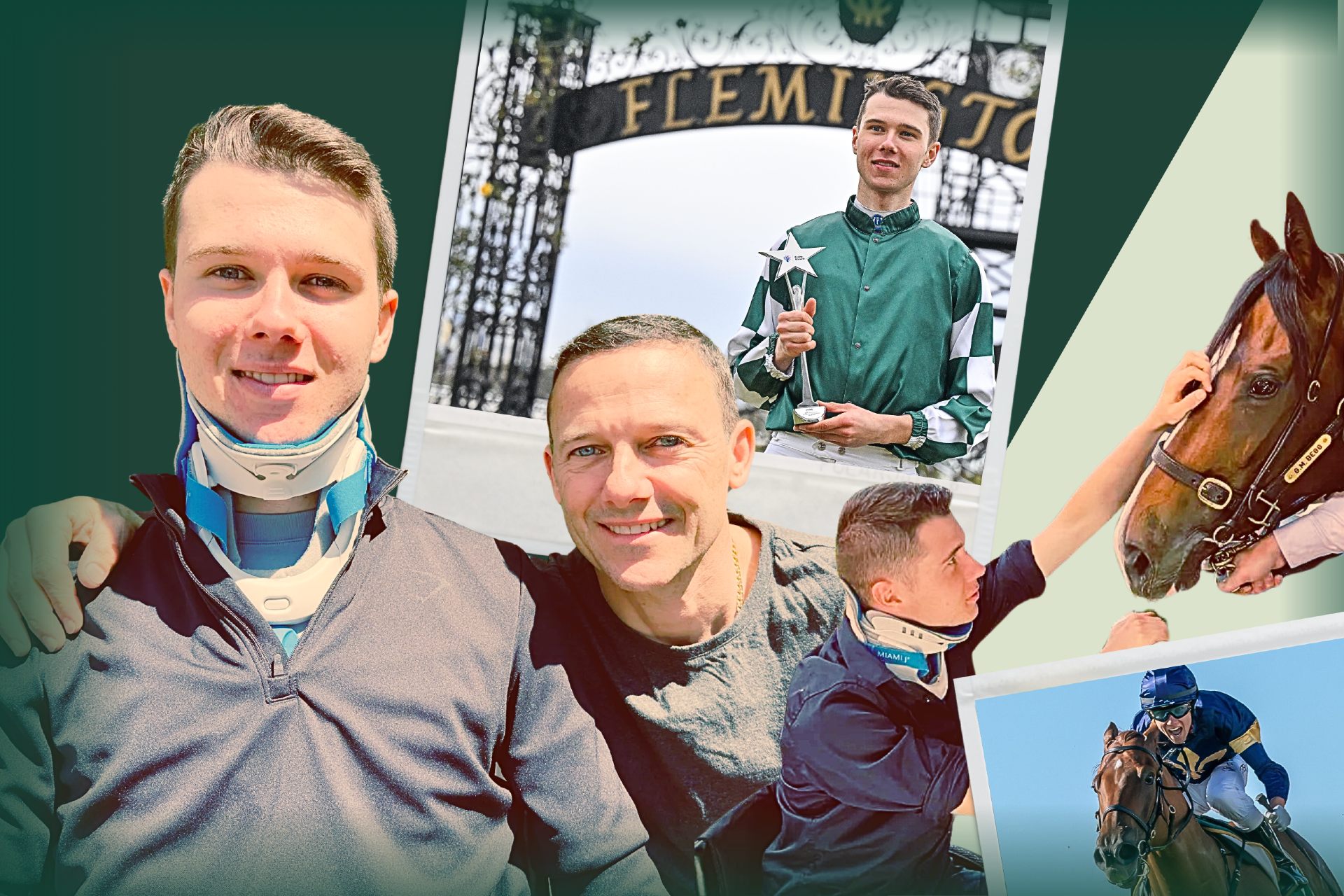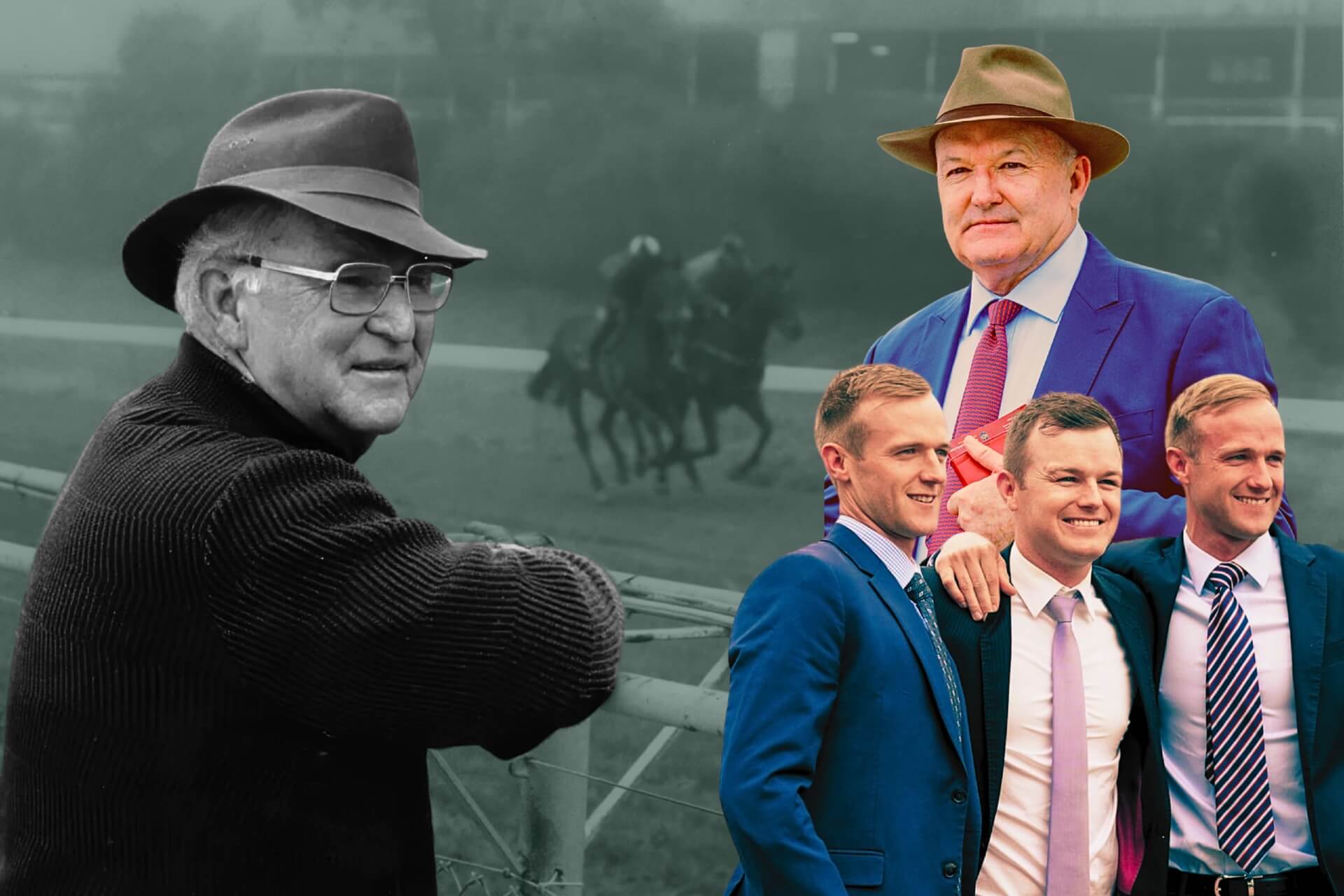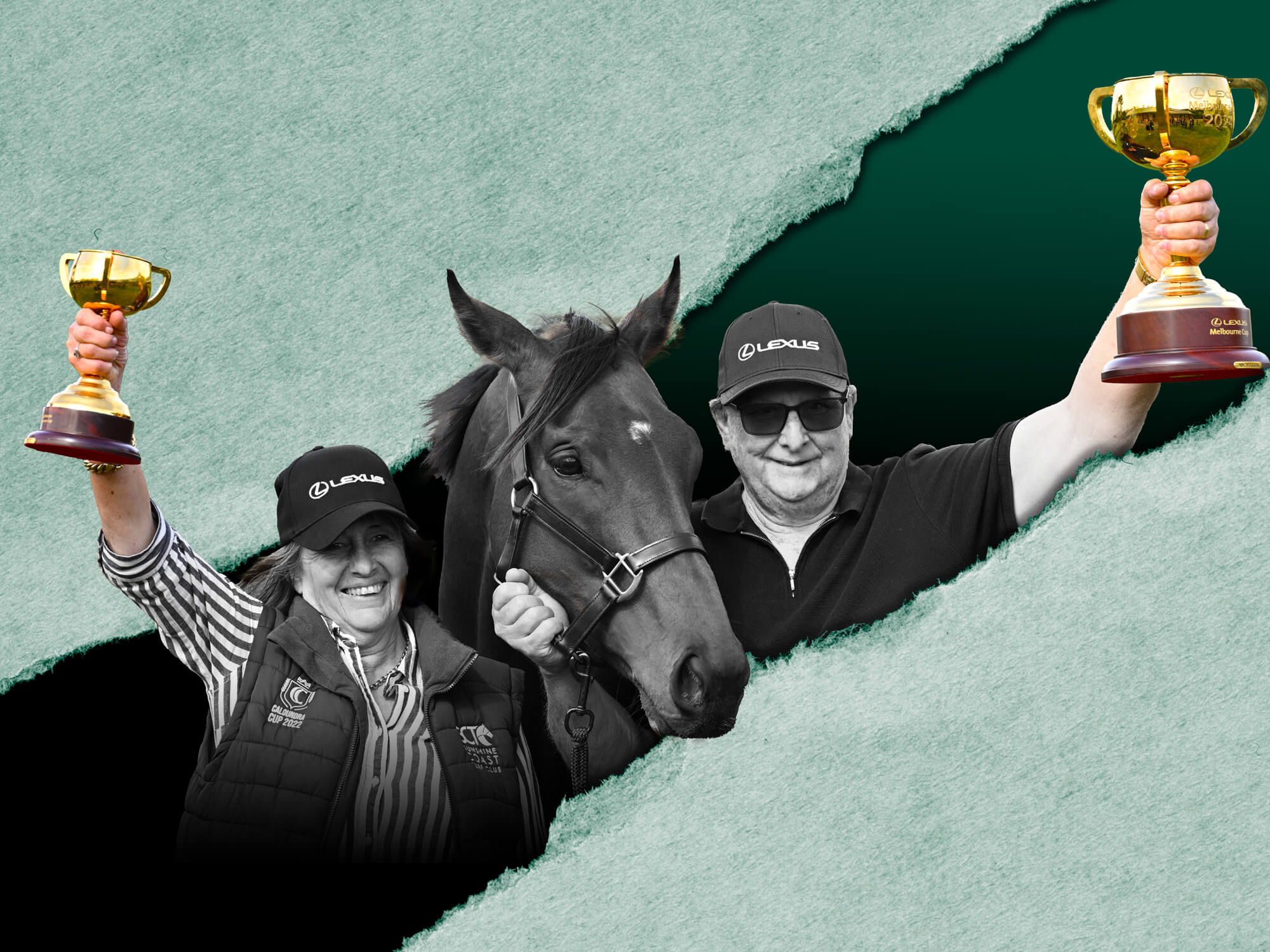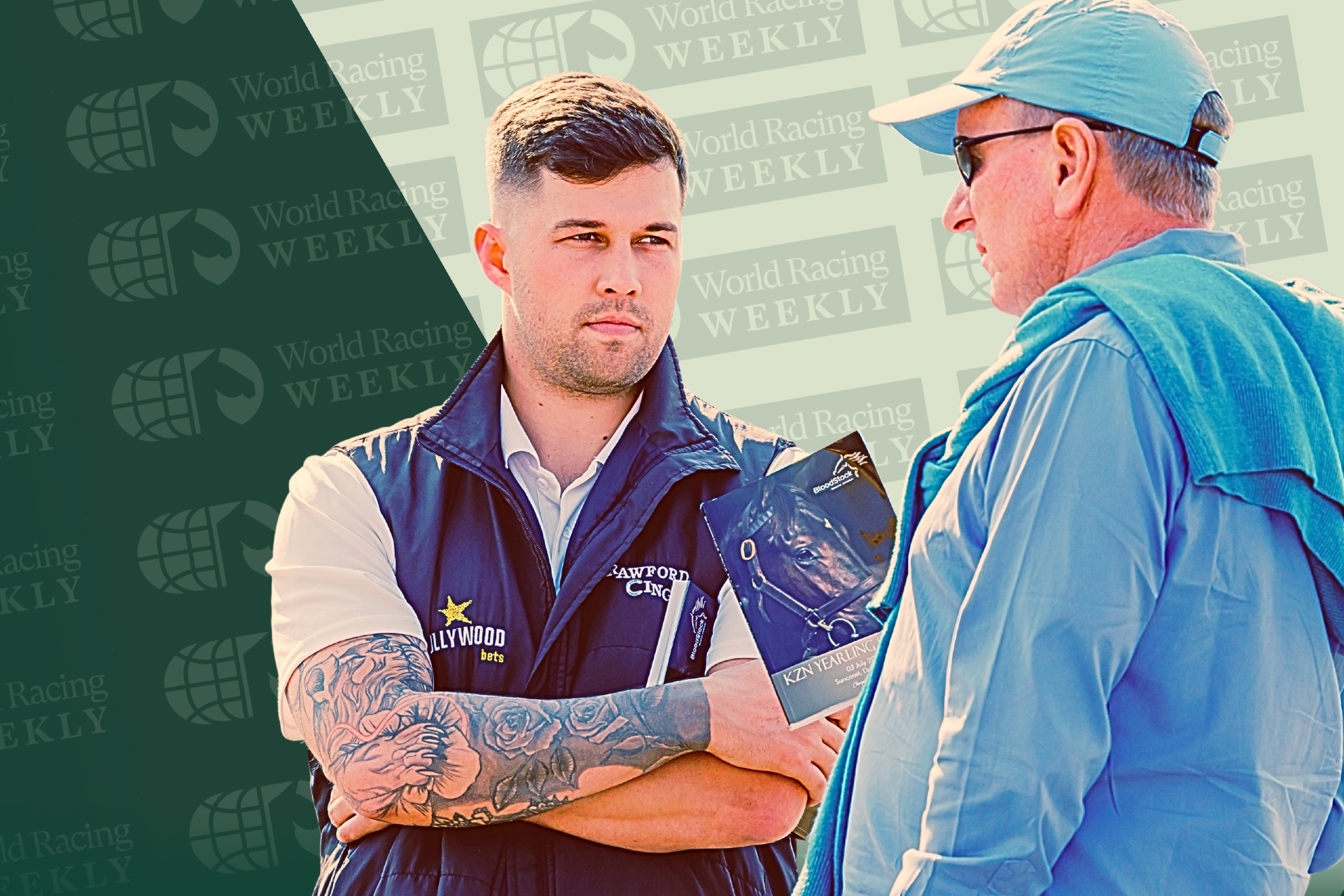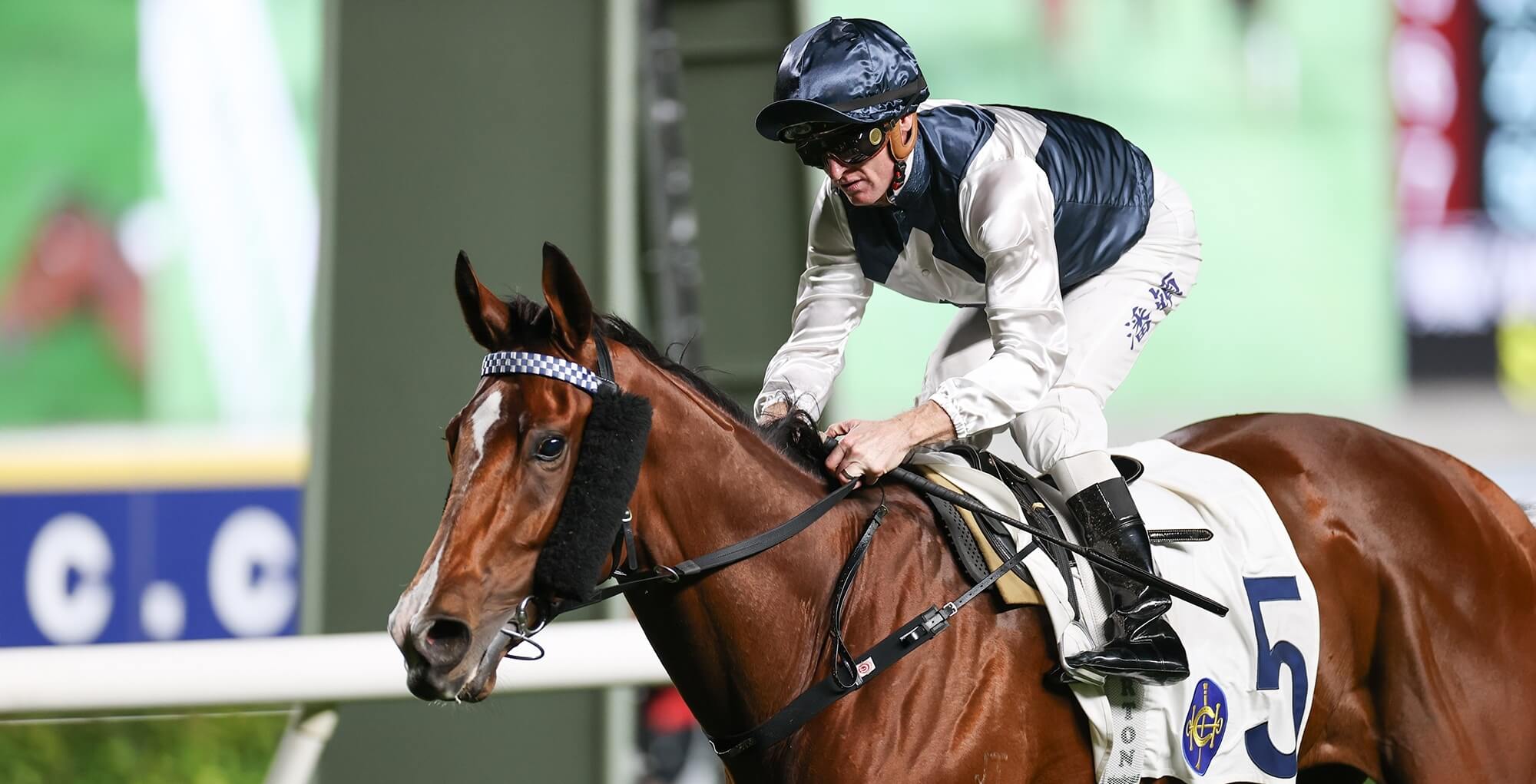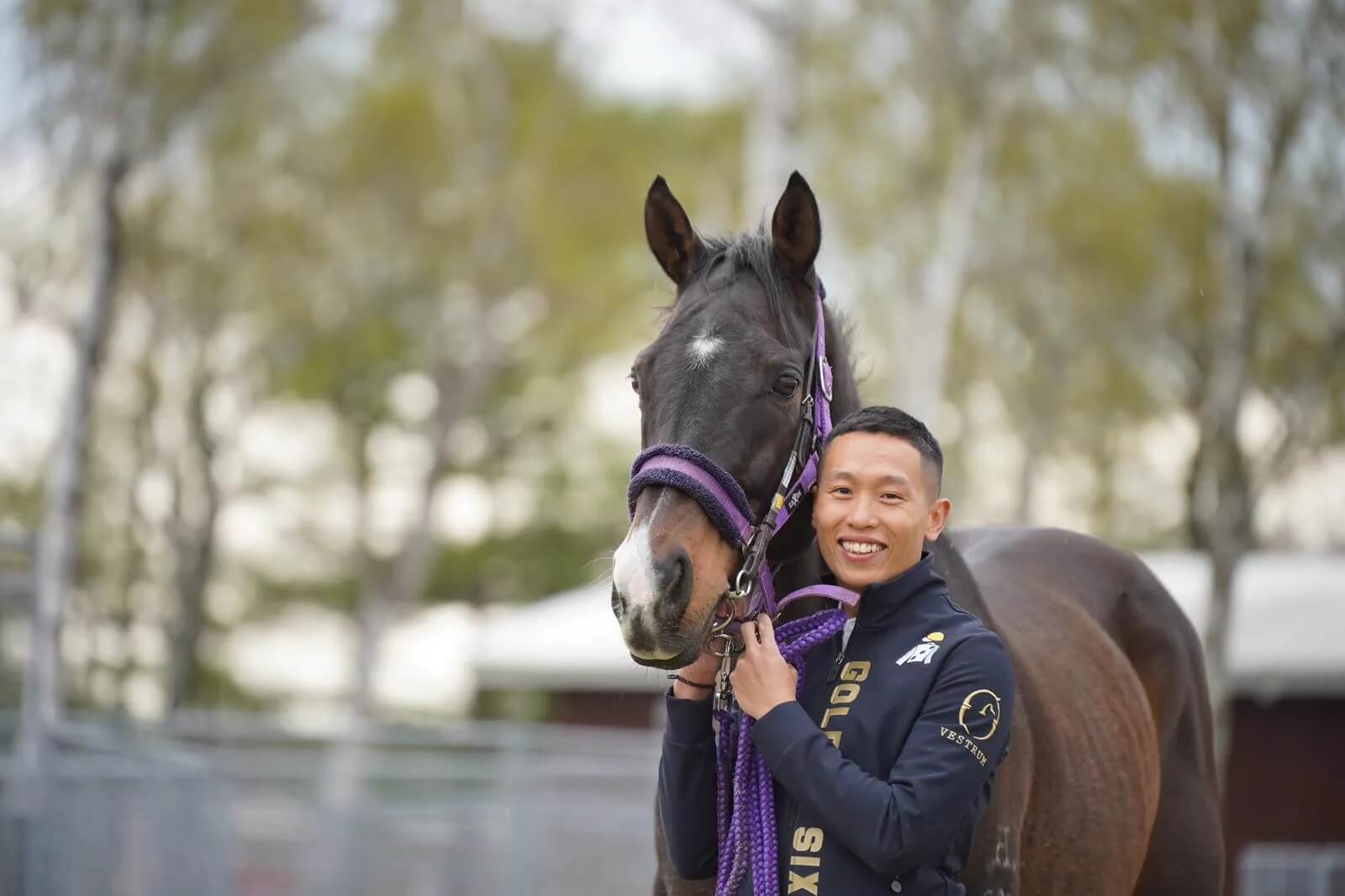Bookies Gasped, Frankie Tipped And Jamie Melham Rode Into History: The Story Of The 2025 Melbourne Cup
From a $500,000 plunge to a Ballarat pub fairytale, the 2025 Melbourne Cup had everything: cash bets, chaos and a horse named Half Yours.
THE ONLY THING whiter than the bookmaker’s suit on Melbourne Cup eve is his face.
Chris Lester is not a name you’re likely to see in the racebook on Cup day, but for a moment it appears the entire buzz about the race is neatly wrapped into a few madcap minutes below his bookmaking stand.
He looks like he’s just seen a ghost. A punter has just walked up to his stand and told him he wants to settle a bet he made a few minutes earlier. He’s splurged $150,000 on the topweight Al Riffa. Lester looks down at two small carry bags, where inside neat bundles of $100 and $50 notes are piled up, one on top of the other.
“F—, I didn’t expect that,” Lester whispers.
The exchange is just one moment of a manic afternoon at the traditional Melbourne Cup Call of the Card, where about 1000 people cram into a room to watch punters joust with four bookmakers who offer odds on every runner in the next day’s Cup.
Agents scream out from all corners of the room to attract the attention of any given bookmaker who has the call. It’s crazy, chaotic, even a bit cathartic. If the Melbourne Cup is your religion, like it is for so many people in Australia, then this is the church to worship at.
$1000 each-way. $10,000 on the nose. $1000 to win, $500 the place. To win $1 million!
“Coming here today, you feel nervous and you don’t know what to expect or what is going to go on,” Lester says.
Lester had an inkling, though. And as the afternoon drags on with betting wading through horses in reverse market order, the call finally rests with Al Riffa, Joseph O’Brien’s classy Irish St Leger winner who has to defy half-a-century of Cup history to lump 59kg to win the next day.
Once the horse’s name is mentioned, the room crackles with electricity, mouths inch closer to microphones ready to shout bets. A television camera hovers next to a table of well-dressed young men. If it’s not recorded, did it really happen?
$500,000 on Al Riffa on behalf of Easygo!
The room hushes, and Lester, who has offered $8 about Al Riffa and has the call, briefly looks at the function host to see if he understood the bet. Was it A$500,000 on the horse, which would mean they would collect A$4 million? Or a bet to win A$500,000?
“I shit myself to be honest,” Lester shrugs to Idol Horse.
He takes the bet. The room applauds. Some hearty punters even give him a standing ovation for doing so.
“We heard some rumours (about a potential big bet),” Lester says. “Just trying to manage that was like, ‘f—, what do we do here?’ I wasn’t sure what I was thinking, but I had a bet back arrangement with Ladbrokes to take on some (of the wager).”
The bet was made by Easygo, the parent company of Stake.com, founded by gambling tech billionaire Ed Craven. It’s a publicity stunt which delivered bang for its buck. Money comes easily, and goes easily apparently.
Legendary jockey Frankie Dettori, an ambassador for Stake.com who announced his retirement (again) last week save for a few final commitments in South America, told the Easygo team to back Al Riffa. Whatever they had in mind, find some more.
“He said, ‘the rain is coming, don’t be put off by that. Keep going’,” Easygo’s director of sports book and poker Chris Boddie says, briefly consulting his public relations notes in anticipation of media interest after the bet.
“We’re a tech company born here in Melbourne and we really wanted to get around the biggest thing around the world in Melbourne, outside the Aussie Open (tennis). It’s the Melbourne Cup.
“We came here with the idea of putting the biggest bet on ever. There was a little bit of back and forth with the Victorian Bookmakers’ Association because the bet that we might have wanted to put on might have hit some tax threshold. I believe it’s not the biggest bet in history, but we wanted something historic.
“We settled on the A$500,000 and here we are today. The idea was to actually have Frankie here …”
If someone wrote the history of the Melbourne Cup, Dettori would have his own chapter. The harder he tried to win one of the world’s biggest races, the worse it seemed to get. He came to Flemington 17 times, finished second twice, and in the jocular words of three-time Cup-winning jockey Glen Boss, “slaughtered a few” too.
One of the best photos ever taken of the Cup was in 2019 when Dettori, riding a Lloyd Williams-owned horse, was part of a driving finish to the line. He was second past the post, and as he wheeled his horse into the runner-up enclosure, there was no flying dismount. He stood crestfallen, head sunken into his hands.
A photographer captured him next to the saddlecloth bearing the name of his horse. It was called Master Of Reality.
“I feel like crying,” said Dettori after the race before later being relegated to fourth on protest.
The charm of the Cup’s history is the tales of everyday people who have trained or owned a winner of Australia’s great race, while the world’s best can never get their hands on the three-handled trophy.
Dettori never won it, and now seemingly wants to spend the rest of his life advising people to back the winner. Aidan O’Brien can’t win it, but son Joseph can. Luca Cumani came down every year, smiled, smoked, then returned home every year without winning. Willie Mullins is a training genius everywhere bar Melbourne.
But property directors and pub owners can.
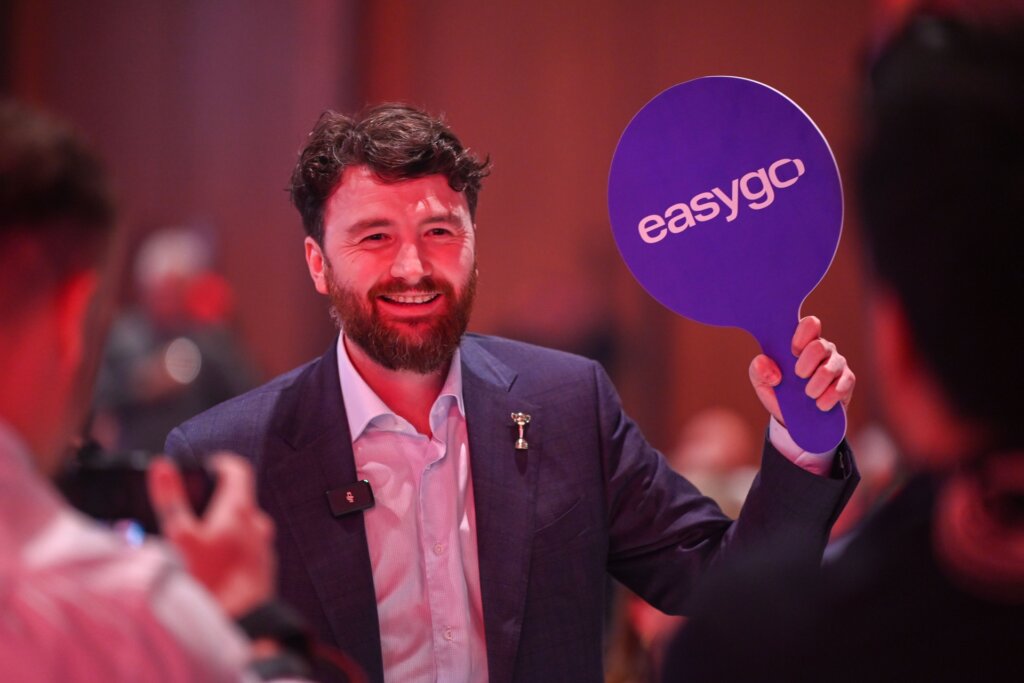
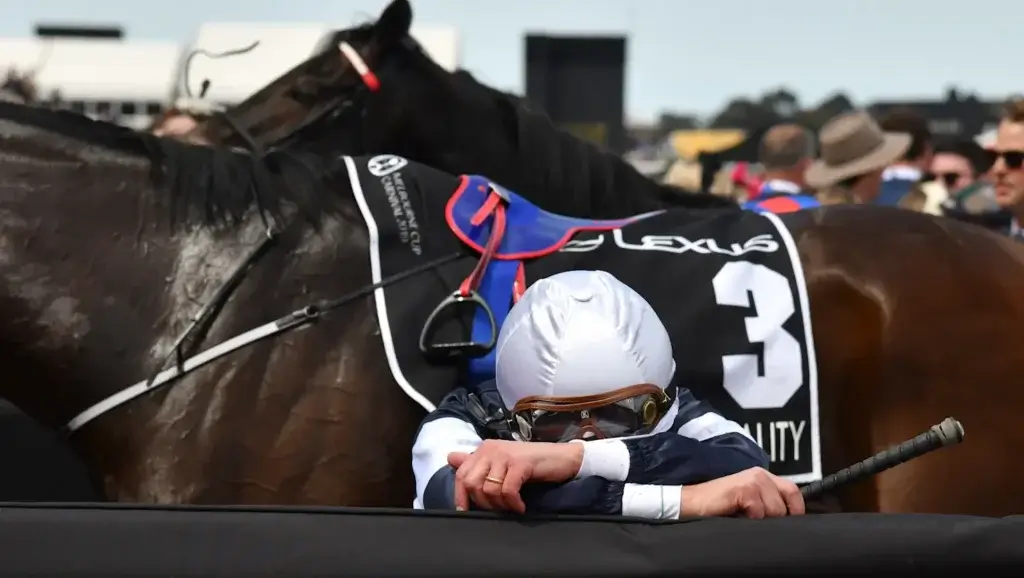
“Good things happen in pubs.”
Amid the hum of a mounting yard minutes after the Melbourne Cup, where winners experience outer body experiences and 23 others connections lament what might have been, a lone voice rises above others as Jamie Melham slips off the back of the race’s winner, Half Yours.
The last owner into the horse after Half Yours was snapped up for $305,000 at a dispersal sale, Dave Canny runs three pubs in Ballarat, the hearty Victorian town known for its cold winters and penchant for fast racehorses. Canny was the final one to buy into the late Col McKenna-bred horse after striking up a friendship with trainer Tony McEvoy, who drank at his pub.
“The McEvoys have been known to have a few drinks,” says McEvoy, who trains in partnership with son Calvin.
Melham won’t have to buy a drink in Ballarat ever again, either.
It was almost fate Melham would win this Melbourne Cup: a fortnight after Half Yours won the Caulfield Cup, in the same year she married fellow jockey Ben Melham, and 10 years after good friend Michelle Payne was the first woman to ride a winner in the history of the race, which began in 1861.
Before bets started flying around the room at the Call of the Card, Melham was interviewed at the function. She was asked had she imagined what it would be like to win the Melbourne Cup.
“Ask me after 3pm tomorrow,” she fired back.
Melham nervously smiled after she said it, a cocktail of confidence and coyness.
So, what did it feel like?
“You cannot describe this feeling,” she says after Half Yours stormed to victory from Joseph O’Brien’s Goodie Two Shoes and Ciaron Maher’s Middle Earth. “I’ve dreamt about it this week, I’ve hoped for it, but nothing prepares you for this feeling. It’s insane.”
It’s not a stretch to say there hasn’t been a racing identity which has generated as much publicity in Australia as Melham (nee Kah) since the Winx era catapulted Chris Waller and Hugh Bowman into the national conscience.
She’s smashed glass ceilings: the first female to win the Melbourne jockeys’ premiership with more than 100 winners in a season, countless Group 1 wins, now a Caulfield-Melbourne cups double. They’re the highs.
The lows have been crippling, too. A shocking fall in 2023 left her with bleeding on the brain and months out of the saddle. Then there’s the scandals, perhaps part of the growing-up-in-the-public-eye phase. A photo was uploaded to social media from a then housemate with Melham in the vicinity of white powder. There’s no suggestion of wrongdoing on behalf of Melham. She was also suspended for breaking COVID regulations at a house party with other jockeys.
Truthfully, she’s most at home with Ben and tending to her own horses when she’s not riding them.
“She cops her fair share of criticism,” Ben Melham tells Idol Horse. “She’s the first person people are willing to throw shit at.
“She’s got a thick skin, but at the end of the day it’s a predominantly male-dominated sport and she’s performed probably better than them. It’s undeserved because she gives up a lot of time and effort to promote the industry.
“She works bloody hard and she’s a great ambassador for the industry. She’s brought a lot of young girls to the races and the sport, a lot of young attention to the sport. She’s worked her arse off and she’s a world class jockey.
“I’m very proud.”
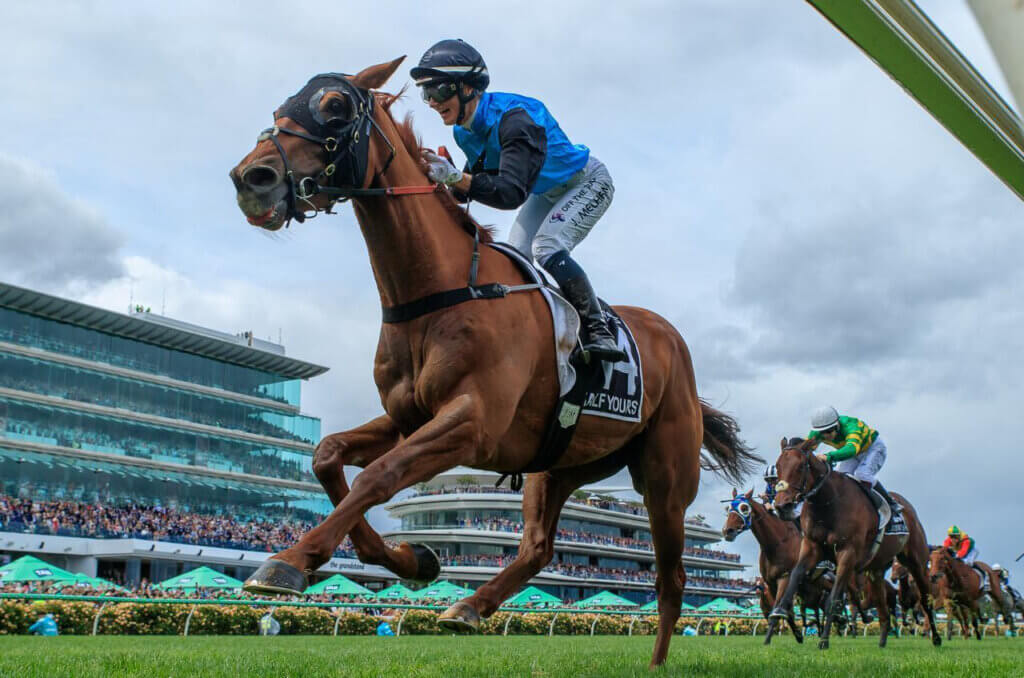
The night before the Melbourne Cup, the Melhams sat down and watched replays of previous two-mile marathons at Flemington. Shortly after they turned into the straight, Jamie slipped through the first of two narrow gaps, rushing straight past Ben’s fading mount Smokin’ Romans. Another similarly narrow chute presented itself a few strides later. Melham, and Half Yours, didn’t blink.
“It shows an elite horsewoman and a great jockey,” Tony McEvoy says of the daring ride.
“We were training a lot of winners in Adelaide and this young girl kept knocking us off and beating us. We were trying to find a way of beating her and Cal would say, ‘if you can’t beat them, join them’.
“We tried to get Jamie to come on board with us and she was just lengths ahead of everyone in Adelaide.”
So, what makes her such a good jockey?
“She doesn’t get frazzled,” Ben says. “She’s not a big form student, but she’s a good horse person. Whether it’s showjumping, cattle cutting horses to racehorses, it’s everything. She’s just a natural horsewoman whose got beautiful hands and capable of thinking in a race and executing on the big stage.”
As the heads of her fellow riders bobbed up and down like corks in the ocean in the draining final stages of the Cup, Melham’s poise on Half Yours as he surged to the finish line was noticeable.
She lowers her back beneath the wind, almost in perfect unison with her horse, an extension where one can’t be separated from the other. It’s a riding style which should be shown in apprentice schools all around the country, largely filled by young girls who outnumber boys these days, all clamouring to be the next Jamie Melham.
Much like Payne transitioning to a trainer post-Cup glory, no one can really know how long Melham will keep riding. It’s easy to forget, but Melham has previously hinted at one day potentially trying to compete at an Olympic Games in equestrian. Those pursuits take years of patience and bottomless pockets. That’s the future though, the Cup was now.
After climbing onto a television set where she stood to next to Payne, and then later posing for photos together, it was a reminder that scenes like this will soon be the norm rather than the exception.
“It’s been long enough, 10 years (since the last female winner),” Melham says. “I had to do it sooner or later.”
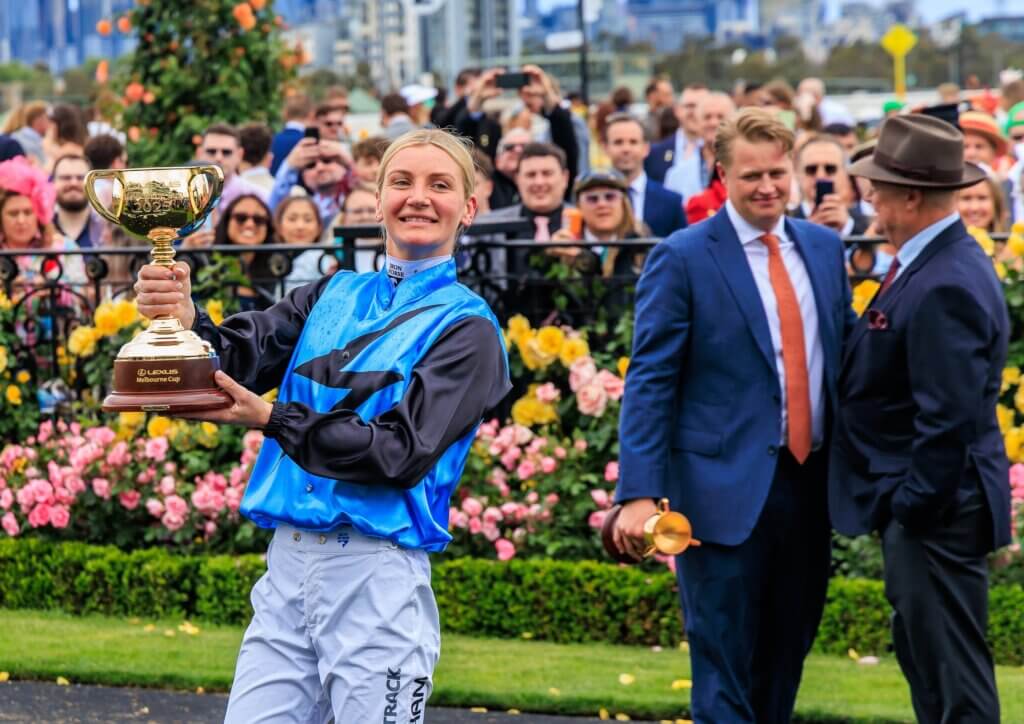
As far as good outcomes go for officials each Melbourne Cup, almost top of the list is for all 24 horses to complete the course without injury.
Until a few years ago, the modern day Melbourne Cup had a horrific casualty record, mostly European-trained horses with more brittle bone structures failing to adapt to the firmer Flemington track and the outer Melbourne quarantine training base.
After Aidan O’Brien’s Anthony Van Dyck broke down in the straight when being asked for one final effort in front of empty COVID-induced grandstands in 2020, the race changed forever. He was the sixth horse to die in the Cup in seven years.
“We had an unfortunate series of injuries on the world stage with millions of people watching,” Racing Victoria chief executive Aaron Morrison says. “We had to make some changes and take some action. We were in a pretty bad place.
“People have short memories and maybe some people just don’t know. We nearly lost our social licence. We had government and other partners coming in saying, ‘why should we support this industry going forward?’”
Instead, horses now have to undergo extensive scans and imaging to be cleared fit to race, with Europeans asked to undergo the process at Newmarket before even leaving for Australia.
More than two weeks before this year’s Cup, the pre-post favourite and Cox Plate contender Sir Delius failed his scans. He was immediately withdrawn from both races. This year’s race had no deaths.
Outside the front of one of the main spectator entrance gates on Tuesday, a dozen protestors wave placards at young and dressed-up men and women about to have the time of their lives (the crowd was 84,374). The activists are organised, digitally sophisticated, and relentless with their presence every year.
“We don’t think there’s anything wrong with people having a good time,” says Elio Celotto from the Coalition for the Protection of Racehorses.
“When it comes to the Melbourne Cup, most people come for a good time, it’s got nothing to do with the races. I’ve been to the races myself. Once I found out the reality, my conscience has forced me to take an active stance against horse racing.”
Some more extroverted punters tell them to “f— off” while entering the track. Others ask, “what are they trying to achieve?”
“Their songs are catchy, though,” one jokes.
But they’re not going away, albeit the racing industry is finally standing up for itself through co-ordinated campaigns from agencies like Kick Up designed to counter campaigning from anti-racing groups.
“We’re aware we’re not got going to eliminate the industry,” Celotto says. “Obviously, we would love that to happen, but we’re real. We want to see dramatic improvements made.
“The industry is not going to close off tomorrow. It’s going to be around for a long, long time. But they can make changes like banning the whip and create a level playing field, which would mean horses not being urged on when they’re tired and reduce the amount of breakdowns.”
While Melham glowed, there was a reminder that the anti-racing brigade are ready to pounce on any little morsel.
As Half Yours returned to scale, there was a bit of blood found near his mouth. Social media seized on it. Vets later reported it was a minor cut to the inside of his cheek. He required no further treatment.
Two races after Melham’s moment, former Cup-winning jockey Blake Shinn suffered a nasty fall and was transported to hospital with a suspected broken leg. There’s no more awkward silence than a racetrack silence when a jockey is thrown from a horse. The final race was delayed until another ambulance arrived on course, ready to follow riders around at work. They deserve every cent they get.
Out the back of the grandstand, the cash was being counted and trading hands on the Cup result. The colour had finally returned to Lester’s face, knowing the Al Riffa buffeting he took at the Call of the Card hadn’t come off. The horse steamed home from an impossible position to finish seventh. His name won’t be on the honour roll, but Lester might have just won more cash than Melham from the Cup.
And that’s especially so when you consider, as they walked out of the track and into the evening with Ben helping carry Jamie’s bags, the pair said “I do” earlier this year. Half of hers is also half of his, I suppose.
“They might have to change the name to Half Mine,” Ben laughs. ∎

